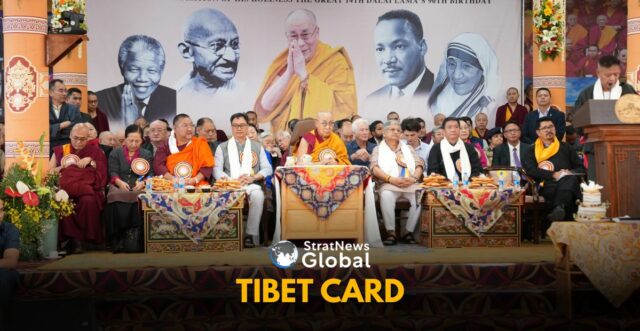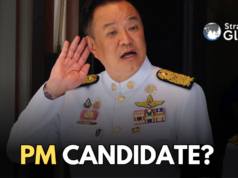Just ahead of External Affairs Minister S. Jaishankar’s visit to China for the SCO Foreign Ministers’ meeting, the Chinese embassy in New Delhi on Sunday warned India against playing the “Xizang card”.
Accusing Indian “strategic and academic communities, including former officials,” of making “improper remarks” about the Dalai Lama’s reincarnation, embassy spokesperson Yu Jing posted on X: “In reality, Xizang‑related issue is a thorn in China-India relations and has become a burden for India. Playing the ‘Xizang card’ will definitely end up shooting oneself in the foot.”
(Xizang, for the uninitiated, is Beijing’s official term for Tibet.)
Yu went on to claim that such commentary was “contrary to [the] Indian government’s public stance,” and warned that Indian experts should be “fully cognizant” of the sensitivity, stressing that the Dalai Lama’s reincarnation is “an internal affair of China” that brooks “no interference from external forces.”
Her post comes days after the Dalai Lama’s reaffirmation—just before his 90th birthday on July 6—that his successor will be chosen through traditional Tibetan Buddhist practices under the authority of the Gaden Phodrang Trust, founded by him.
Strategically, this warning is timed to pre-empt External Affairs Minister Jaishankar’s visit, which is expected to pave the way for Prime Minister Modi’s attendance at the SCO Leaders’ Summit in Beijing this August. Beijing clearly seeks to set rhetorical traps before any substantive diplomacy begins.
As expected, Ms Yu’s remarks sparked a pushback on X, ranging from sarcastic comments to downright abuse.
“India recognises Tibet as an “autonomous” region of China. Common sense would dictate that the succession of the Dalai Lama is part of the autonomy under which Tibet operates,” declared a former IAF fighter pilot and military analyst.
“Allowing Tibetans to wear their traditional attire, eat their traditional food, and live in traditional homes cannot be equated with autonomy since every Chinese citizen has those rights. As a diplomat, you should have the sense not to threaten your host country with statements such as – Playing the “Xizang card” will definitely end up shooting oneself in the foot,” he said.
“And please don’t issue threats to ordinary Indians on what we can or cannot do. This is not China, and we have not struck a Faustian bargain with our political leaders. Stay in your lane,” added a senior journalist.
Let’s be clear: the Dalai Lama’s succession is a religious, not strategic, matter. Only the Tibetan Buddhist community—led by His Holiness himself—has the moral authority to decide the process. The idea that an atheist, authoritarian regime which has systematically suppressed Tibetan culture can appoint its own successor is not just absurd—it is Orwellian.
India, which has hosted the Dalai Lama and Tibetan exile community since 1959, has maintained a carefully balanced stance of diplomatic neutrality. But Beijing now demands not only silence, but submission.
When Indian minister of parliamentary affairs recently Kiren Rijiju affirmed that only the Dalai Lama and his tradition can decide succession, he upheld religious autonomy—not “played the Xizang card.” China’s fury reveals Beijing’s insecurity over the issue.
The real irritant in China–India ties is not Tibet—it is China’s own provocations.
From the Galwan clash of 2020 to continued military pressure along the Line of Actual Control, Beijing has shown scant respect for bilateral trust. Now it seeks to reframe spiritual matters as diplomatic provocations—yet again shifting attention from its own provocations.
The Dalai Lama is a global symbol of nonviolence and moral authority, and his legacy remains untarnished. Suggesting his succession is a “thorn”—or worse, issuing veiled threats—is not diplomacy. It’s intimidation.
If Jaishankar’s visit is meant to build momentum toward a Modi–Xi summit, India must respond with strategic clarity, not rhetorical appeasement. The message must be firm: Tibetans choose Tibetan leaders. India will defend moral autonomy within its borders.
The last time Beijing threw a tantrum over the Dalai Lama—in 2017—it ended with his visit to Arunachal Pradesh.
That visit sent a message Beijing needs to hear again: moral authority cannot be manufactured by bureaucrats. Nor can it be silenced by tweets.
In a career spanning three decades and counting, Ramananda (Ram to his friends) has been the foreign editor of The Telegraph, Outlook Magazine and the New Indian Express. He helped set up rediff.com’s editorial operations in San Jose and New York, helmed sify.com, and was the founder editor of India.com.
His work has featured in national and international publications like the Al Jazeera Centre for Studies, Global Times and Ashahi Shimbun. But his one constant over all these years, he says, has been the attempt to understand rising India’s place in the world.
He can rustle up a mean salad, his oil-less pepper chicken is to die for, and all it takes is some beer and rhythm and blues to rock his soul.
Talk to him about foreign and strategic affairs, media, South Asia, China, and of course India.





